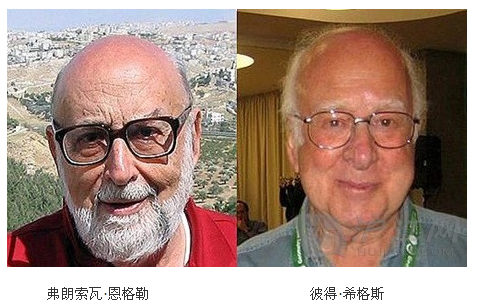The Higgs boson, or the "God particle," which was discovered last year, garnered two physicists the Nobel Prize in physics on Tuesday.
Nearly 50 years ago, Francois Englert of Belgium and Peter Higgs of the United Kingdom had the foresight to predict that the particle existed.
Now, the octogenarian pair share the Nobel Prize in physics in recognition of a theoretical brilliance that was vindicated by the particle's discovery last year.
The Royal Swedish Academy of Sciences awarded the prize to them.
Higgs and Englert's theories behind the elusive Higgs boson explained what gives matter its mass.
The universe is filled with Higgs bosons. As atoms and parts of atoms zoom around, they interact with and attract Higgs bosons, which cluster around them in varying numbers.
Certain particles will attract larger clusters of Higgs bosons, and the more of them a particle attracts, the greater its mass will be.
The explanation helped complete scientists' understanding of the nature of all matter.
"The awarded theory is a central part of the Standard Model of particle physics that describes how the world is constructed," the Royal Swedish Academy said in a post on Twitter.
As is tradition, the academy phoned the scientists during the announcement to inform them of their win. They were unable to reach Higgs, for whom the particle is named.
The conversation with Englert was short and sweet. "I feel very well, of course," he said, when he heard the news. "Now, I'm very happy."

【新闻快讯】
2013年诺贝尔物理学奖10月8日在瑞典揭晓,比利时理论物理学家弗朗索瓦·恩格勒和英国理论物理学家彼得·希格斯因希格斯玻色子的理论预言获奖。
希格斯玻色子(Higgs boson)又称上帝粒子(God particle),是粒子物理学标准模型预言的一种自旋为零的玻色子。它是标准模型中最后一种未被发现的粒子。它可以帮助解析为何其它粒子会有质量。
1964年,恩格勒和罗伯特·布绕特(已故)共同提出希格斯机制与希格斯玻色子理论。同年,彼得·希格斯也在《物理评论快报》发表文章,提出希格斯机制理论。
2011年12月13日,欧洲核子研究中心科学家宣布,他们发现了希格斯玻色子存在的迹象。但经考虑实验其它误差后,宣布实验结果无效。2012年7月4 日科学家宣布发现了一个新粒子,与希格斯玻色子特征有吻合之处。







